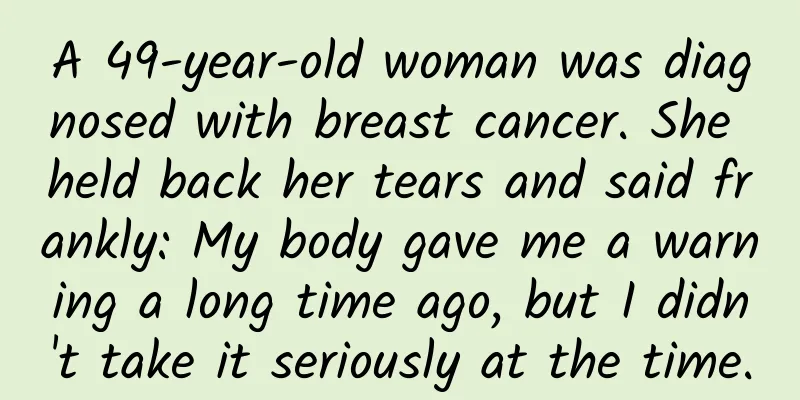A 49-year-old woman was diagnosed with breast cancer. She held back her tears and said frankly: My body gave me a warning a long time ago, but I didn't take it seriously at the time.

|
As a gynecologist, I have seen too many patients miss the best time for treatment because they ignored some subtle changes in their bodies. Some women shared with me: "Doctor, I felt something was wrong at the time, but I didn't know it was this!" So, today I will give you some popular science, hoping to help you find the problem earlier and feel at ease earlier. Let me first talk about one of my recent patients. Her name is Sister Li, 49 years old, who was just diagnosed with breast cancer. I remember that she said to me in the clinic, trying to hold back tears: "Doctor, I have felt something was wrong for a long time. My breasts hurt from time to time, and I can feel a small lump inside, but I always thought I was tired and didn't pay much attention to it." Hey, I felt mixed emotions when I heard this. In fact, Sister Li's situation is not an exception. Many women have some inadvertent "little problems" in their lives, but they are often easily ignored. We must understand that the body is the least likely to lie. These seemingly insignificant symptoms may be breast cancer silently sending you signals. Breast lumps: Breast lumps are one of the main symptoms of breast cancer. These lumps are usually unrelated to changes in the menstrual cycle and will gradually become thicker and larger. Nipple discharge: Nipple discharge in women who are not breastfeeding is mostly a pathological change, among which bloody discharge has a higher risk of cancer. Breast skin changes: Breast cancer may cause the skin of the breast to appear wrinkled or inward, forming the so-called "dimple sign." Abnormal nipple shape: Inverted nipples or changes in the nipple's axis may be a sign of breast cancer. Swollen axillary lymph nodes: Both mastitis and breast cancer may cause swollen axillary lymph nodes, which may be an early sign of breast cancer. I know that faced with this situation, everyone must be panicking, and may even comfort themselves by saying it is a small problem, but this is a major matter concerning health! Just like Sister Li, if she had noticed it earlier and come to me earlier, perhaps a false alarm could have been avoided. Fortunately, medicine is now advanced and the cure rate for early breast cancer is quite high, so we must pay attention to these small warning signs. What are the effective preventive measures for early breast cancer? Early prevention measures for breast cancer include: Regular self-examination: Perform breast self-examination at a fixed time every month, and observe and touch the breasts on both sides to see if there are any abnormalities such as nodules or lumps. Healthy lifestyle: eat a balanced diet, exercise moderately, get enough sleep, and avoid excessive fatigue and mental stress. Limit alcohol intake: Alcohol intake is associated with breast cell hyperplasia, and reducing alcohol intake can reduce the risk of cancer. Vitamin D supplementation: Vitamin D may be beneficial in preventing breast cancer. You can increase the amount of vitamin D in your body through sunlight exposure, food intake, or taking vitamin D supplements as prescribed by your doctor. Genetic counseling and risk assessment: If there is a family history, you should seek the help of a genetic counselor to conduct a risk assessment and develop a personalized prevention plan based on the results. Breast cancer screening: Women of appropriate age should undergo regular breast cancer screening. Common screening methods include breast physical examination, breast ultrasound examination, and mammography. Those with abnormal screening results should follow the doctor's advice and go to a regular medical institution for further examination. Avoid or limit alcohol consumption: Alcohol intake has been linked to breast cell hyperplasia, and reducing alcohol intake can reduce your risk of cancer. It is recommended that women have no more than one glass of red wine a day and men have no more than two glasses of beer. Vitamin D supplementation: Vitamin D has the function of regulating the immune system and may be beneficial in preventing breast cancer. You can increase your vitamin D levels through sun exposure, food intake, or taking vitamin D supplements as directed by your doctor. Genetic counseling and risk assessment: Professional assessment can help understand an individual's risk of breast cancer and take targeted measures. If there is a family history, you should seek help from a genetic counselor to conduct a risk assessment and develop a personalized prevention plan based on the results. Get screened for breast cancer regularly: Early detection, early diagnosis, and early treatment are the key to improving the cure rate of breast cancer. Women of appropriate age should undergo regular breast cancer screening. Common screening methods include breast physical examination, breast ultrasound, and mammogram. Keep in mind that these measures can't guarantee that you won't get breast cancer, but they can help lower your risk. If you have any questions or concerns, please consult your doctor or professional healthcare provider. How to determine whether you are at high risk for breast cancer People at high risk of breast cancer usually refer to those who have an increased risk of breast cancer due to certain specific factors. Here are some common criteria for judgment: Family history: If you have a first-degree relative (such as mother, sister, daughter) who has been diagnosed with breast cancer, your risk increases. Especially if you have relatives who were diagnosed with breast cancer at a younger age, your risk may be higher. Personal medical history: If you or an immediate family member has had other breast cancer-related conditions, such as atypical ductal or lobular hyperplasia, this may also increase your risk. Age and menstrual cycle: The risk of breast cancer increases with age. In addition, early age of menarche (less than 12 years old) and late age of menopause (greater than 55 years old) are also considered risk factors for breast cancer. Lifestyle factors: Unhealthy eating habits, lack of exercise, smoking and excessive drinking may increase the risk of breast cancer. Genetic factors: Certain genetic mutations can also significantly increase the risk of breast cancer. How to do a self-examination Self-examination can help you detect any changes in your breasts, including lumps, dimpling of the skin, or nipple discharge. Here are some basic self-examination steps: Observe the appearance of the breasts: Check for symmetry and for any lumps or skin changes. Touch your breasts: Lie flat on your back and gently touch your breasts with your fingers to feel for any lumps. Check the nipples: Check the nipples for discharge, especially if it is bloody. If you find any suspicious changes during self-examination, or if you have the high-risk factors for breast cancer mentioned above, it is recommended that you seek medical attention in time. Your doctor may recommend further imaging tests or a biopsy to confirm the presence of breast cancer. Here, I would like to call on all female friends to do a breast self-examination every month. If you feel something is wrong, come and have a look. Don't be like Sister Li, who regrets it when the problem becomes serious. Health is not a trivial matter. Being responsible for yourself is also responsible for your family. Remember, early detection and early treatment of problems are the wisest choice. Finally, I hope every woman can have a healthy body and bloom the most beautiful smile. Let's work together to protect our health, okay? After all, nothing is more important than life, don't you think? |
Recommend
What are the treatment methods for irregular menstruation? You can eat these 8 kinds of food to effectively replenish qi and blood for irregular menstruation
What medicine should I take to regulate my irregu...
Things to note in daily life to relieve dysmenorrhea
Women often feel uncomfortable before and after m...
Experts explain the main high-risk groups for cervical erosion
Some female friends are at high risk of cervical ...
Endometriosis test items
Normally, if a woman suffers from endometriosis, ...
Lose 8,000 calories by cycling for 3 days? Doctors: Excessive exercise may lead to "overtraining syndrome"
Travel program host Wei Huaxuan once rode a bicyc...
What should we pay attention to during the treatment of pelvic inflammatory disease?
What should we pay attention to during the treatm...
Introduction: The two main symptoms of adnexitis
There are two main types of adnexitis. Almost all...
What to eat for pelvic inflammatory disease?
What to eat for pelvic inflammatory disease? Pelv...
What is the reason for not having uterine fibroids? Will I get uterine cancer if I don't have uterine fibroids?
What is the reason for not having uterine fibroid...
Detailed introduction to the symptoms of vaginitis
Vaginitis is the disease with the highest inciden...
Experts explain the more common symptoms of chronic adnexitis
If you can find the symptoms of chronic adnexitis...
Which department should I go to for adenomyosis?
Patients with adenomyosis and qi stagnation and b...
Bacterial vaginosis recurring after menstruation
Bacterial vaginosis recurs after menstruation. If...
Advantages of microecological therapy in treating vaginitis
There are many ways to treat vaginitis. Microecol...
The epidemic prevention doctor shared 4 tips for postpartum weight loss: breastfeeding, exercise, and adopting the Deshu diet
Postpartum physical and mental changes Several st...









